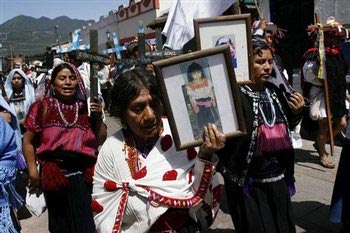
|  |  |  Editorials | Issues | August 2009 Editorials | Issues | August 2009  
Mexico Court Orders 22 Tied to ’97 Killings Freed
 Marc Lacey - New York Times Marc Lacey - New York Times
go to original
August 13, 2009


| | Relatives of those killed in the 1997 Acteal massacre carry photos during a march in San Cristobal, Chiapas, Mexico, Tuesday, August 11, 2009. (AP/Moyses Zuniga) |  |
Mexico City — Mexico’s Supreme Court ordered 22 indigenous people freed from prison on Wednesday after finding that federal prosecutors used forged evidence and false testimony to implicate them in a 1997 massacre in a tiny hamlet in Chiapas.

Gunmen crept down a hillside into Acteal on Dec. 22, 1997, and opened fire on the local population, killing 45 people, including pregnant women and young children. The case, which drew international outrage, prompted Ernesto Zedillo, then the president, to order a vigorous investigation of the crime.

The deaths have haunted the community ever since, as both the victims and perpetrators were impoverished Tzotzil Indians who lived side by side. Of the 79 people convicted of participating in the killings, 57 joined to appeal their convictions.

In a 4-to-1 vote that laid bare the deficiencies of the Mexican criminal justice system, the court ruled that prosecutors and lower court judges had violated the rights of 22 of the accused in their rush to justice. The court ordered that four more prisoners be resentenced and said the convictions of 31 others would be reviewed in the coming days.

Justices remarked that they were not ruling on the guilt or innocence of the accused but were making a statement about the bungled prosecution.

“Acteal is a good opportunity for the court to reiterate a clear message to the authorities in charge of pursuing crimes — your actions ought to always respect, scrupulously, the Constitution and human rights,” said Juan Silva Meza, one of the judges backing the decision.

From the very beginning, the massacre has been mired in confusion. It appeared to stem from the rebel revolt begun by the Zapatistas on New Year’s Day in 1994. The people of Acteal formed a group called Las Abejas, or the Bees, which backed the rebels. But some neighboring communities sided with the government.

Government investigations in subsequent years showed that officials and police officers ignored warnings of impending violence and then tampered with the crime scene afterward. In the immediate aftermath of the massacre, an aggressive investigation was conducted, one that defense lawyers said used the horror over the killings to round up rebel sympathizers who were nowhere near Acteal that day.

Outside the court on Wednesday, the deep divisions still associated with the case were on full display. Representatives of Las Abejas gathered at the entrance to denounce the decision to free those convicted of killing their relatives. They predicted more violence and said the court would have blood on its hands if the released prisoners took up arms out of vengeance.

“I want to make it very clear that the government is letting free assassins, people who killed women and children in cold blood,” said Matzuwa Villasana, 63, a member of Las Abejas. “They ought to be in prison.”

Down the street, relatives of the accused men celebrated the decision, which they said righted a terrible wrong.

The appeal was headed by Javier Angulo, who teaches constitutional law at Mexico City’s Center for Investigation and Economic Studies. He called the Acteal case one of the country’s longest and most complex legal matters.

One of the suspect pieces of evidence introduced by prosecutors was a detailed list of the perpetrators of the massacre supposedly prepared by Agustín Arias Díaz, a local resident. But the list was written in Spanish, a language he barely spoke, and he later acknowledged that he was handed the list by the authorities.

“It could be that they were innocent or guilty,” said José Ramón Cossío Díaz, one of the judges, who criticized the authorities for inventing evidence. “That’s not my function as a constitutional judge.”

Antonio Betancourt contributed reporting. |

 |
|  |



